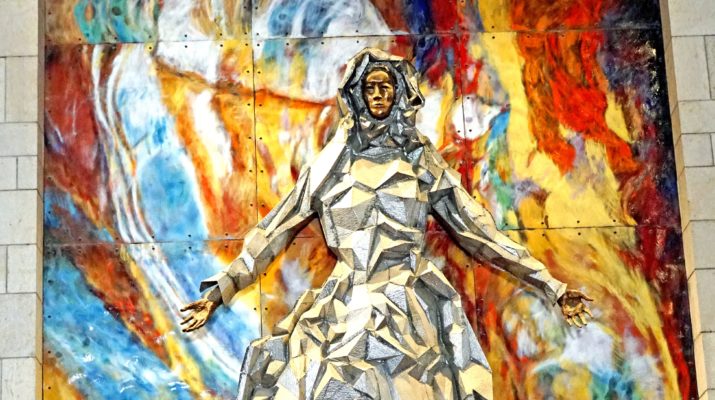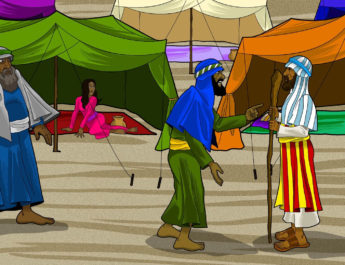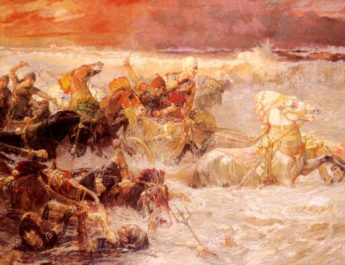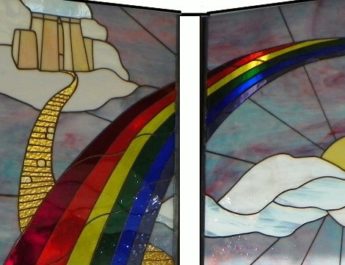Proverbs 8:1-4, 22-31
Trinity Sunday C29
1 Does not wisdomA callB
and understandingC raiseD her voice?E
A “wisdom” = chokmah. From chakam (to be wise or teach wisdom; this is wisdom in thought, word, or action). This is wisdom, wit, or skillfulness.
B “call” = qara. This is to call or call out – to call someone by name. Also used more broadly for calling forth.
C “understanding” = tebunah. From bin (to discern, consider, attend to; distinguishing things in one’s mind or, more generally, to understand). This is understanding, discernment, discretion, intelligence, skill, fruit, an argument.
D “raise” = natan. This is to give, put, set, offer. It is to give literally or figuratively.
E “voice” = qol. This is a sound, used often for human voices. Also used when God speaks or angels, animals or instruments. It can be a cry or a noise, thunder or earthquakes and so on.
2 On the heights,F beside the way,G
at the crossroadsH she takes her stand;I
F “heights” = rosh + marom. Rosh may come a word that means to shake. It is the head, captain, or chief. It can also be excellent or the forefront. It can be first in position or in statue or in time (i.e. the beginning). Marom is from rum (to be high, rise, exalted, become proud, display, offer, present, set apart, extol; to rise in a literal or figurative sense). This can be height, high place, or lofty. It can be either exalted or haughty/proud. It can refer to dignity or to heaven.
G “way” = derek. From darak (to tread, march, to walk. Can also mean affixing a string to a box since one needs to step on it to bend it in the process; so also an archer). This is a road as a thing that is walked on. Can be used figuratively for the path that one’s life takes or how one chooses to live one’s life.
H “crossroads” = bayit + nathiyb. Literally, “the place of the paths.” Bayit is probably from banah (to build, make, set up, obtain children; to build literally or figuratively). This is house, court, family, palace, temple. Nathiyb has a root that may mean to tramp. This is a path beaten from regular use. So, it is pathway or traveler.
I “takes…stand” = natsab. This is to station, appoint, establish, take a stand.
3 besideJ the gatesK in frontL of the town,M
J “beside” = yad. This is hand, ability, power. Hand in a literal sense, but also what one can do or the means by which one does it.
K “gates” = shaar. May be related to sha’ar (to calculate or reckon; may come from a root that means to open up or split). This is a gate, door, or other opening like a port.
L “front” = peh. This is mouth in a literal or figurative sense. So, more literally, it can be beak or jaws. More figuratively, it refers to speech, commands, or promises.
M “town” = qereth. 5x in OT– 1x in Job and 4x in Proverbs. From qarah (to happen, meet, bring about). This is a town or city.
at the entranceN of the portalsO she cries out:P
N “entrance” = mabo. From bo (to come in, go in, enter). This is entrance, coming in – the process of entering or the place of entrance. It can also mean the setting of the sun i.e. the west.
O “portals” = pethach. From pathach (to open wide in a literal or figurative sense; to open, draw out, let something go free, break forth, to plow, engrave, or carve). This is any kind of opening – a door, entrance, gate.
P “cries out” = ranan. This is a cry of joy or a joyful song. Properly, it is emitting a shrill sound, especially one of joy.
4 “To you, O people,Q I call,
and my cryR is to all who live.S
Q “people” = ish. Perhaps from enosh (human, humankind, mortal); from anash (to be weak, sick, or frail). This is man, husband, another, or humankind.
R “cry” = qol. Same as “voice” in v1. See note E above.
S “all who live” = ben + adam. Literally, “children of humankind.” Ben is related to “crossroads” in v2. From banah (see note H above). This is son, age, child. It is son in a literal or figurative sense. Adam is perhaps from adam (to be red, make ruddy); related to adamah (ground, dirt, earth). This is man, humankind, also Adam’s name. It refers to a human individual or humanity.
22 “The LordT createdU me at the beginningV of his work,W
T “Lord” = YHVH. From havah (to be, become) or hayah (to come to pass, become, be). This is the name of the God of Israel, the self-existent and eternal one, the tetragrammaton. This pronunciation has been lost to time so “Lord” is generally used in its place.
U “created” = qanah. This is to acquire, create, purchase, own. Its root may mean to smith or to produce.
V “beginning” = reshit. Related to “heights” in v2. From rosh (see note F above). This is beginning, first place, highest rank, chief thing.
W “work” = derek. Same as “way” in v2. See note G above.
the firstX of his actsY of long ago.Z
X “first” = qedem. Perhaps from qadam (to come in front or be in front; to meet, anticipate, confront, receive, or rise; sometimes to meet for help). This is front, formerly, before, east, eternal, everlasting, antiquity.
Y “acts” = miph’al. 3x in OT. From pa’al (to do, make, work, or accomplish; generally refers to regularly repeated or systematic action – to practice). This is work, deed, something manufactured, thing.
Z “long ago” = az. This is beginning, now, from, since.
23 Ages agoAA I was set up,BB
at the first, beforeCC the beginningDD of the earth.EE
AA “ages ago” = olam. This is a long scope of time whether in the past (antiquity, ancient time) or in the future (eternal, everlasting).
BB “set up” = nasak. This is to cover, pour out, offer like a libation, or to cast like one casts metal. By analogy, it can mean anointing a king.
CC “before” = qedem. Same as “first” in v22. See note X above.
DD “beginning” = rosh. Same as “heights” in v2. See note F above.
EE “earth” = erets. Root may mean to be firm. This is earth, ground, field land, or country.
24 When there were no depthsFF I was brought forth,GG
when there were no springsHH aboundingII with water.JJ
FF “depths” = tehom. Perhaps from hum (to roar, murmur, cause an uproar, agitate; to defeat in battle, destroy). This is the deep or the abyss. Either understood as a formless empty place of nothingness or as a place of confusion filled with water – the deep the feeds the waters of the earth.
GG “brought forth” = chul. This is whirling around so dancing as in a circle or writhing in pain. It is used particularly for the pain of childbirth or from writhing due to fear. It can also be falling in pain or waiting.
HH “springs” = mayan. From ayin (eye, appearance; eye in a literal or figurative sense; a fountain). This is a spring, well, or fountain. Figuratively, this is a source of contentment.
II “abounding” = kabad. To be heavy, weighty, or severe. It can also be positive abounding in, rich, or honorable. The Hebrew word for “glory,” kabod, is taken from this root.
JJ “water” = mayim. This is water, waters, or waterway in a general sense. Figuratively, it can also mean juice, urine, or semen.
25 BeforeKK the mountainsLL had been shaped,MM
beforeNN the hills,OO I was brought forth,
KK “before” = terem. May come from a word that means to interrupt. This is not yet or before.
LL “mountains” = har. From harar (hill or mountain). This is mountain, hill, hilly region.
MM “shaped” = taba. 10x in OT. This is sink, drown, settle, or fasten.
NN “before” = paneh. From panah (to turn, face, appear). This is face in a literal or figurative sense. It could be face, presence, anger, respect. It can also be used of God to indicate divine favor or presence.
OO “hills” = gibah. From the same as Geba (Geba or Gibeah; hillock); from the same as gabia (cup, bowl, flower; root might mean being convex). This is hill or little hill.
26 when he had not yet madePP earth and fieldsQQ
or the world’sRR firstSS bits of soil.TT
PP “made” = asah. This is to make, do, act, appoint, become in many senses.
QQ “fields” = chuts. Root may mean to sever. So, this is something that is separated by a wall – the outside, the street, a field, highway, or abroad.
RR “world’s” = tebel. From yabal (to lead, bring, carry, conduct; properly, to flow; to bring or lead with fanfare). This is world, confusion, inhabited part of the earth, but also used for the whole world.
SS “first” = rosh. Same as “heights” in v2. See note F above.
TT “bits of soil” = aphar. May be related to aphar (to throw dust, be dust). This is dust as powdered, perhaps gray colored. It could be ashes, powder, ground, dry earth, clay mud, or rubbish.
27 When he establishedUU the heavens,VV I was there;
when he drewWW a circleXX on the faceYY of the deep,ZZ
UU “established” = kun. Properly, this means in a perpendicular position. So, it is set up in a literal sense – establish, fix, fasten, prepare. In a figurative sense, it is certainty, to be firm, faithfulness, render sure or prosperous.
VV “heavens” = shamayim. Root may mean being lofty. This is sky, the air, or heaven. It is in a dual noun form so this might refer to the part of the sky where the clouds move on the one hand and the part beyond that where the sun, moon, and stars are on the other hand.
WW “drew” = chaqaq. 19x in OT. This is to inscribe, carve, or decree. It can be a lawmaker/commander or a staff/scepter. Literally, this is engraving, but it implies enacting a law because laws were carved into stone or metal.
XX “circle” = chug. 3x in OT– all in reference to the dome of heaven or circle on the deep. From chug (to make a circle, compass, draw around). This is a circle or horizon.
YY “face” = paneh. Same as “before” in v25. See note NN above.
ZZ “deep” = tehom. Same as “depths” in v24. See note FF above.
28 when he made firmAAA the skiesBBB above,CCC
when he establishedDDD the fountainsEEE of the deep,
AAA “made firm” = amets. This is to be strong, stout, alert, or bold, It can also mean harden, make firm, be courageous or mighty, fortify, or establish. It can refer to physical alertness or mental courage or steadfastness.
BBB “skies” = shachaq. From shachaq (to rub off, wear away, pulverize). This is powder, dust, vapor. It can also refer to the sky or a cloud.
CCC “above” = maal. From alah (to go up, ascend, be high, be a priority; to arise in a literal or figurative sense). This is the upper part, forward, high above, upwards, greater, heaven, or exceedingly.
DDD “established” = azaz. 12x in OT. This is to be strong, become fixed, be bold, prevail, be impudent. It means to be stout literally or figuratively.
EEE “fountains” = ayin. Related to “springs” in v24. See note HH above.
29 when he assignedFFF to the seaGGG its limit,HHH
FFF “assigned” = sim. This is to put or place in a literal or figurative sense. It can be appoint, care, change, make, and may other things.
GGG “sea” = yam. Root may mean to roar. This is the sea, often referring to the Mediterranean. It comes from the root in the sense of the roar of crashing surf. This word is sometimes used for rivers or other sources of water. It can mean to the west or to the south.
HHH “limit” = choq. Related to “drew” in v27. From chaqaq (see note WW above). This is statute, boundary, condition, custom, limit, ordinance It is something that is prescribed or something that is owed.
so that the waters might not transgressIII his command,JJJ
when he marked outKKK the foundationsLLL of the earth,
III “transgress” = abar. This is to pass over or cross over. It is used for transitions, whether literal or figurative. It can also mean to escape, alienate, or fail. This is the root verb from which “Hebrew” is drawn.
JJJ “command” = peh. Same as “front” in v3. See note L above.
KKK “marked out” = chaqaq. Same as “drew” in v27. See note WW above.
LLL “foundations” = mosad. 2x in OT. From yasad (to establish, appoint, instruct; to set in a literal or figurative sense; also, to sit down together and so to consult or take counsel). This is foundation.
30 then I wasMMM besideNNN him, like a master worker,OOO
and I was dailyPPP his delight,QQQ
MMM “was” = hayah. Related to “Lord” in v22. See note T above.
NNN “beside” = etsel. From atsal (to reserve, refuse, join, separate, keep). This is nearby, toward, joining.
OOO “master worker” = amon. 1x in OT. From aman (to believe, endure, fulfill, confirm, support, be faithful, put one’s trust in, be steadfast. Figuratively, this is to be firm, steadfast, or faithful, trusting, believing, being permanent, morally solid). This is an artisan or architect – one who is skilled.
PPP “daily” = yom + yom. Literally, “day by day.” Root may mean being hot. This is the day in a literal or figurative sense. It can also mean birth, age, daylight, continually or other references to time.
QQQ “delight” = shaashuim. 9x in NT. From shaa (to delight, play) OR form sha’a’ (to stare, cry out, amuse self, be blinded, play). This is a delight, pleasure, or enjoyment.
playingRRR beforeSSS him always,
31 playing in his inhabitedTTT worldUUU
and delighting in the human race.VVV
RRR “playing” = sachaq. This is to laugh, celebrate, joke, mock, scorn. This is laughing, whether for joy or scorn. It can imply plays or holding a contest.
SSS “before” = paneh. Same as “before” in v25. See note NN above.
TTT “inhabited” = tebel. Same as “world’s” in v26. See note RR above.
UUU “world” = erets. Same as “earth” in v23. See note EE above.
VVV “human race” = ben + adam. Same as “all who live” in v4. See note S above.
Image credit: “Israel-05292 – USA.” Photo by Dennis Jarvis, 2016.




